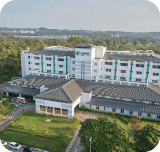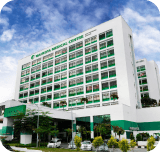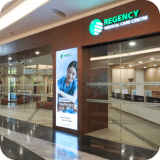Caring for people, in sickness and in health
17 May 2024
Share

The following article was originally published in The Business Times.
FROM seeing just 10,000 patients a year at Balestier Hospital in 1998 to some three million annually across its brands today, Singapore private healthcare provider Health Management International (HMI) has come a long way.
Decades ago, its leadership team realised that the private healthcare sector had a gap that could be filled by introducing more facilities and services to cater to a variety of healthcare needs.
That led to executive chairman and managing director Gan See Khem – in partnership with doctors and shareholders – to restructure Balestier Hospital and begin HMI’s transformation.
Having recently celebrated its 25th anniversary, HMI Group – now led by Dr Gan’s daughter, group chief executive officer Chin Wei Jia – is once again looking at a refresh.
Newly rebranded as HMI Medical, the company unveiled its new logo at this year’s Singapore Business Awards, where it took home the Enterprise Award.
In its new chapter, it aims to package all its offerings across its brands in Singapore and Malaysia to highlight how it continues to provide total health management, as well as better connectivity, convenience and access to quality care.
“We are really looking at the health journey, rather than the patient care journey,” said Chin, who joined the family business in 2002.
Healthcare demand continues to grow with ageing populations and higher per capita incomes, she noted. People now also look at health more holistically.
Typically, healthcare providers see patients when they walk in with a medical condition or query, Chin said. “Now, through our managed healthcare business as well, we are reaching out to more patients when they’re still healthy.”
Tech-powered growth
Technology also enables HMI Medical to reach a wider audience. Chin broke down the technology used into three areas: people-focused, patient-facing, and operations-focused.
For example, a consumer-facing app is in the works for the people-focused segment. It will cover user needs from straightforward concerns such as appointment bookings to patient education, providing information on various medical conditions. Users will also be able to know their next steps: what to do and how to do it; where to go and when; and the quickest process.
“If you look at how people are navigating healthcare (now), it’s fragmented and sporadic,” Chin said, adding that this results in additional costs injected into the health journey.
The app will also extend the reach of its current healthcare technology platform, from business clients to all patients across its brands as well as their families.
Patient-facing applications of technology refer to investing in the latest medical technology and equipment, she said, citing more precise Lasik equipment as an example.
Finally, technology can be leveraged operationally for smart hospital initiatives. In 2021, the group partnered medical technology company Siemens Healthineers to develop medical technologies and digitalisation platforms.
Beyond digitalisation roll-outs to improve workflows, they are working to incorporate artificial intelligence into HMI Medical’s diagnostic processes.
Extending reach in existing markets
“A key focus for us, in the immediate short term, is to fundamentally look at how we can help people improve their health span, not just their lifespan,” said Chin.
Over the years, HMI Medical has transformed from being hospital-focused to a healthcare provider with solutions “across the healthcare continuum” – encompassing mental, emotional and physical health.
Boasting 2,500 employees, the group has primary care and health screening centres, specialist clinics and an ambulatory care facility, as well as a network of more than 1,500 affiliated primary and specialist clinics through its managed healthcare platform.
In FY2022, the formerly listed group’s profit after tax was more than treble the preceding year’s, at US$32.9 million.
By next year, the new extension of Regency Specialist Hospital in Johor – which began construction during the Covid-19 pandemic – will be operational, bringing its bed capacity to 500, the largest in southern Malaysia.
HMI Medical is also reviewing its expansion plans for Mahkota Medical Centre in Malacca, and intends to set up greenfield facilities, such as a comprehensive ambulatory care centre in Johor’s Mid Valley Southkey mall.
The less clinical setting was a deliberate choice to “bring care into the community”, so that the group can reach those who dislike hospital settings, Chin said.
She added: “We can drive a lot more health education and prevention activities, and also… offer specialist healthcare in a different environment.”
Positive impact
Chin’s journey with HMI Medical almost did not happen. Young and idealistic, fresh out of grad school with degrees in economics and international relations in the early 2000s, she planned to obtain a PhD and join an international organisation.
But she heeded the call to enter the family business, while it was restructuring amid financial turmoil.
“It was with the promise that I could continue whatever I wanted to do after the restructuring,” she said.
Working on the ground gave her an appreciation for the company’s work. After the business stabilised, she took a year off, during which she evaluated her options.
HMI’s work was in areas that she was passionate about. And while the business was smaller in scale, it was still able to make an impact, one person at a time.
“It could grow much more,” she said. “Now, 20 plus years later, I think (joining) was the right choice.”



